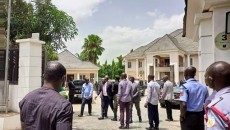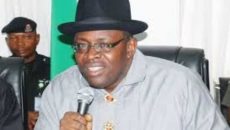
PRES GOODLUCK JONATHAN-(L)-RECEIVING THE REPORTS-OF THE PETROLUEM SPECIAL TASK FORCES FROM MRS DEZIANI ALLISON MADUEKE – WITH THEM IS DOTUN SOLEMN
A coalition of human rights activists and non-governmental organisations has taken up the gauntlet to enforce the recovery of various huge sums of money diverted from the Federation Account
It is a rare collaboration but one that has the common good of Nigerians as its sole objective. Femi Falana, fiery Lagos lawyer and counsel to the Oil Probe Follow-up Group; Tokunbo Mumumi of Social Economic Right Accountability Project, SERAP; Olarewaju Suraj, Human and Environmental Development Agenda, HEDA; Motunrayo Alaka, representing Wole Soyinka Centre for Investigative Journalism; and several others have petitioned Ibrahim Lamorde, executive chairman, Economic and Financial Crimes Commission, EFCC, urging the commission to investigate and fully recover huge sums of money diverted from the Federation Account by individuals and organisations indicted by the report of the Petroleum Revenue Special Task Force of August 2012.
According to the petitioners, the task force, inaugurated on February 28, 2012 by Dieziani Alison-Madueke, minister of petroleum resources, submitted the report of its findings and recommendations to the minister in August 2012 and the report was formally presented to President Goodluck Jonathan on November 2, 2012. However, the petitioners are worried that no action has been taken on the findings and recommendations. “The content of the report suggests that a number of issues bordering on official corruption and fraud are yet to be addressed, and thus require further investigations and action from your distinguished office,” wrote the petitioners.
They also drew the attention of EFCC to the report of the Technical Committee on Payment of Fuel Subsidy submitted on Friday, 13 July 2012, alleging that only selected actions on some findings and recommendations of the report have been undertaken. “However, the content of the report suggests that a number of issues bordering on official corruption are yet to be addressed, and thus require further investigations and action from your distinguished office,” said the petition.
Based on these, the coalition is asking EFCC to as a matter of public duty and in fulfillment of the commission’s statutory mandate as stated in sections 6 and 7 in general and Section 6(h) in particular of the EFCC Establishment Act 2001, to examine the reports with dispassion and with an eye to bringing the perpetrators to justice to preclude a case of abdication of duty.
Specifically, the petitioners want the EFCC to investigate Nigerian National Petroleum Corporation, NNPC’s alleged failure to use prevailing Central Bank of Nigeria, CBN, exchange rates for calculating the value of crude oil sold to its refineries; investigate all relevant circumstances surrounding the alleged non-payment of a reported $167 million in oil block signature bonuses by concessionaires; investigate all relevant circumstances surrounding the alleged failure of the Department of Petroleum Resources, DPR, to collect a reported $2.9 million worth of concession rentals.
Similarly, the petitioners insist that EFCC investigates all relevant circumstances surrounding the alleged non-payment of a reported $3.027 billion in royalties on crude oil and gas produced by named operators, including the alleged $l.5 billion in outstanding royalties owed by Addax Petroleum; investigate all relevant circumstances surrounding DPR’s alleged failure to collect amounts due as gas flare penalties; investigate the reported discrepancies in payment lodgments for gas flaring penalties between records maintained by DPR and CBN; investigate all reported cases in which commodities trading firms lifting NNPC crude oil without having executed term lifting contracts in place and investigate Shell Nigeria Exploration and Production Company, SNEPCO’s alleged non-remittance of a reported N137.572 billion in gas sale proceeds from the Bonga concession that allegedly were due to the federation.
The circumstances surrounding NNPC’s reported accrued deficit of N298 billion are also to be investigated by EFCC with appropriate action taken, as well as the corporation’s reported withholding of crude oil and gas sale proceeds to cover alleged costs associated with crude oil and refined products pipeline sabotage, with a view to determining whether there is a legal provision for the practice, and if so, whether all withholdings were properly taken.
The EFCC debunked claims that it had failed to act on the subject of the petition. Wilson Uwujaren, spokesman of the commission, told the magazine that the commission started investigating cases of corruption in the oil sector in 2012. According to him, Alison-Madueke filed a petition with the commission early 2012 following a nationwide protest on removal of fuel subsidy. He said the commission had since then moved into action and had been able to gather a solid case against 40 organisations and individuals involved in the fuel subsidy scam.
“All of these organisations and individuals have been charged to court and are still being prosecuted. As we speak, there are still cases we are still investigating on subsidy matters that we are yet to take to court. EFCC cannot take a matter to court because a committee indicted them. Law enforcement is based on investigations, and not a pronouncement of a committee or individual. EFCC is doing what it ought to do in the circumstances and the evidence is the cases we have in court,” explained Uwajaren.
But only an unnamed staff of the Petroleum Products Pricing Regulatory Agency, PPPRA, is on the list of those currently being prosecuted. Others are companies and individuals implicated after investigations conducted by EFCC. Asked why only one government official is been prosecuted in view of the wide scale fraud said to have been committed in the oil sector, Uwujaren said some other government officials were serving as prosecution witnesses for the commission.
A source at the commission that pleaded not to be mentioned because he is not authorised to talk to speak for the commission, told the magazine that the EFCC does not have the capacity to tackle the rot in the oil and gas sector. “It is a highly technical sector and it is run like a cult. Even the NNPC does not have the capacity to stem the tide of corruption because it still depends largely on its trade partners for oil and gas production. The NNPC cannot tell you how many barrels of oil we truly produce today because it is not done by them. You need a lot of technical competence and financial muscle to be able to audit the sector,” said the source.
Additional report by Tajudeen Suleiman
Follow Us on Social Media



 WhatsApp us
WhatsApp us